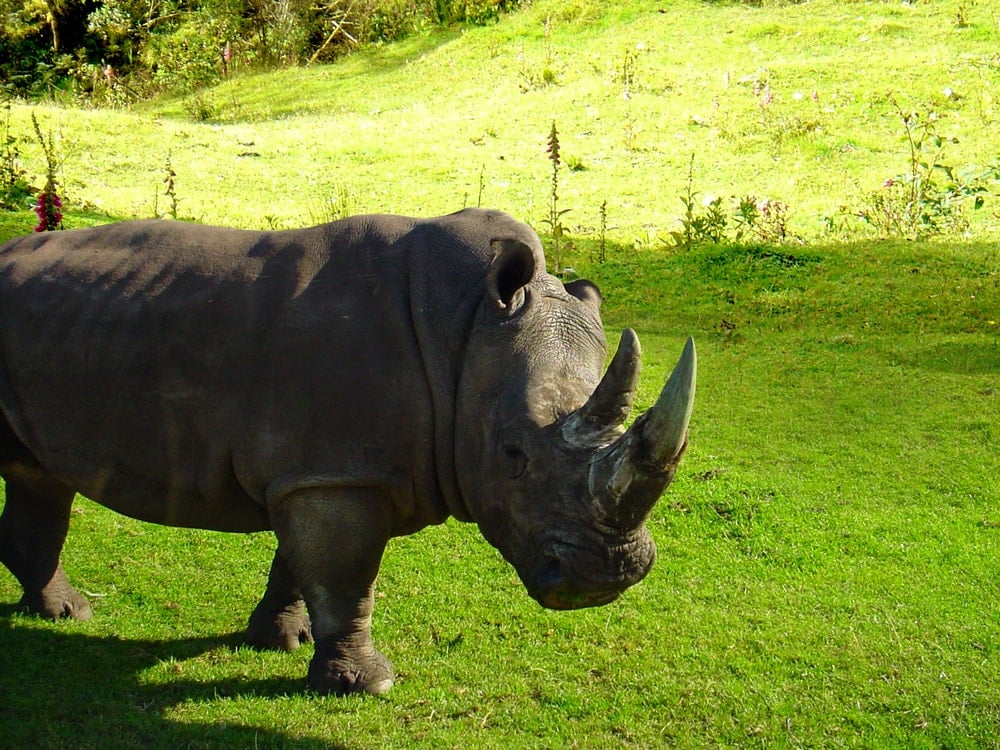The World Bank (International Bank for Reconstruction and Development, IBRD) issued the first-ever Animal Conservation Bond (WCB) to support saving endangered species of South Africa.

The 5-year $150 million "Rhino Bond" also holds a potential Global Environment Facility (GEF) payment. The money goes to the endangered black rhino population in the Addo Elephant National Park (AENP), as well as The Great Fish River Nature Reserve (GFRNR).
The Rhino animal conservation bond is a pioneering instrument to channel investments into conservation efforts. These outcomes will be measured by the number of rhinos increasing. Why Rhinos?

These animals represent a vital part of the ecosystem. In fact, many other animal species depend on those. Therefore, investors can now help financially support critically endangered animal conservation activities.
WCB Rhino bond is the first of its kind
No less significantly, alongside biodiversity contribution, wildlife conservation will also help local communities by creating conservation-related jobs in otherwise unattended South African regions.
The World Bank Group President, David Malpass, says the novel bond is the first of its kind. "The Rhino Bond is a groundbreaking approach to enabling private sector investment in global public goods in this case, biodiversity conservation, a key global development challenge."
Rhino animal conservation bond aids the conservation of other species that live in their habitat. So naturally, the preserved ecosystem will help job creation and the economy via tourism in South Africa.
'The pay-for-success financial structure protects an endangered species and strengthens South Africa's conservation efforts by leveraging the World Bank's infrastructure and track record in capital markets. Importantly, it can be replicated and scaled to channel more
private capital for other conservation and climate actions and development objectives worldwide' added Malpass.

How does the rhino bond work?
Instead of getting coupon payments, the Wildlife Conservation Bond investors will pay to aid the rhino conservation efforts at the two parks mentioned above.
These investments will prove effective should the number of rhinos grows. Conservation Alpha will calculate its growth rate, and the Zoological Society of London will verify it.
Once thriving, the IBRD will use the Global Environment Facility (GEF) funds and give the investors a successful payment at maturity. Additionally, they will also get principal Rhino bond redemption.
Notably, this is a fresh approach to investing in conservation since it shifts the risks to investors and enables the donors to finance the outcomes. The public-private collaboration could serve as a great example of how to craft future transactions to help biodiversity all over the globe.
Public-private partnership to improve biodiversity
Global Fixed Income at Nuveen is excited to be the primary investor in WCB. "We are proud to be the lead investor in this innovative transaction that provided attractive total return potential and the direct and measurable outcomes we look for under our proprietary Impact Framework.
We are especially hopeful that this type of public-private partnership can serve as a template for future transactions to help improve biodiversity globally", said Stephen M. Liberatore, Head of ESG/Impact – Global Fixed Income.

The innovative bond could not come at a more critical time, said the CEO and Chairperson of the Global Environment Facility. "GEF is delighted to support this innovative conservation bond which opens a new avenue for financing biodiversity protection at a critically important time. Furthermore, this is a great example of how capital markets can meet investor and conservation priorities", said Carlos Manuel Rodriguez.
"The GEF's financial backing for this bond gave it the risk/return profile investors needed to enter the biodiversity space. I am confident that their engagement will only grow from here, with future conservation bonds that benefit other umbrella species and their ecosystems".
Benefits for the entire ecosystem
GEF chose the two protected parks for their capacities to reach these conservation goals significantly since they will also aid to clean water and pollinator habitats.
"This bond will significantly increase the funding for the Great Fish River Nature Reserve, which is much needed to scale up activities to protect and grow our rhino populations and increase benefits to local communities and the economy.
Watch: Seaspiracy shows why we should treat fish not as fish but as wildlife
In addition, funding will support increased staffing and training, improved national and regional coordination, and investments in equipment, infrastructure, and technology", said CEO of ECPTA Vuyani Dayimani.
South Africa at the forefront of a pioneering conservation instrument to save endangered species
The Minister of Forestry, Fisheries, and the Environment is optimistic that the Wildlife Conservation Bond will help the rhino growth rate in South Africa.
"We are excited to be at the forefront of an innovative new financial instrument to boost our efforts to protect the world's largest rhino population.
We want to acknowledge and express our appreciation for the considerable effort by numerous role players over the last few years that has resulted in this much-needed injection of funding into the biodiversity sector”, said Barbara Creecy.
"We are confident that this will assist in increasing the rhino growth rate and stimulate the development of additional novel market-based mechanisms to support the objectives of the New Deal for People with Nature.
South Africa is committed to securing nature's contribution to people through well-managed and expanding Conservation Areas that contribute to inclusive rural economic growth in thriving Biodiversity Economy Nodes", concluded Creecy.






